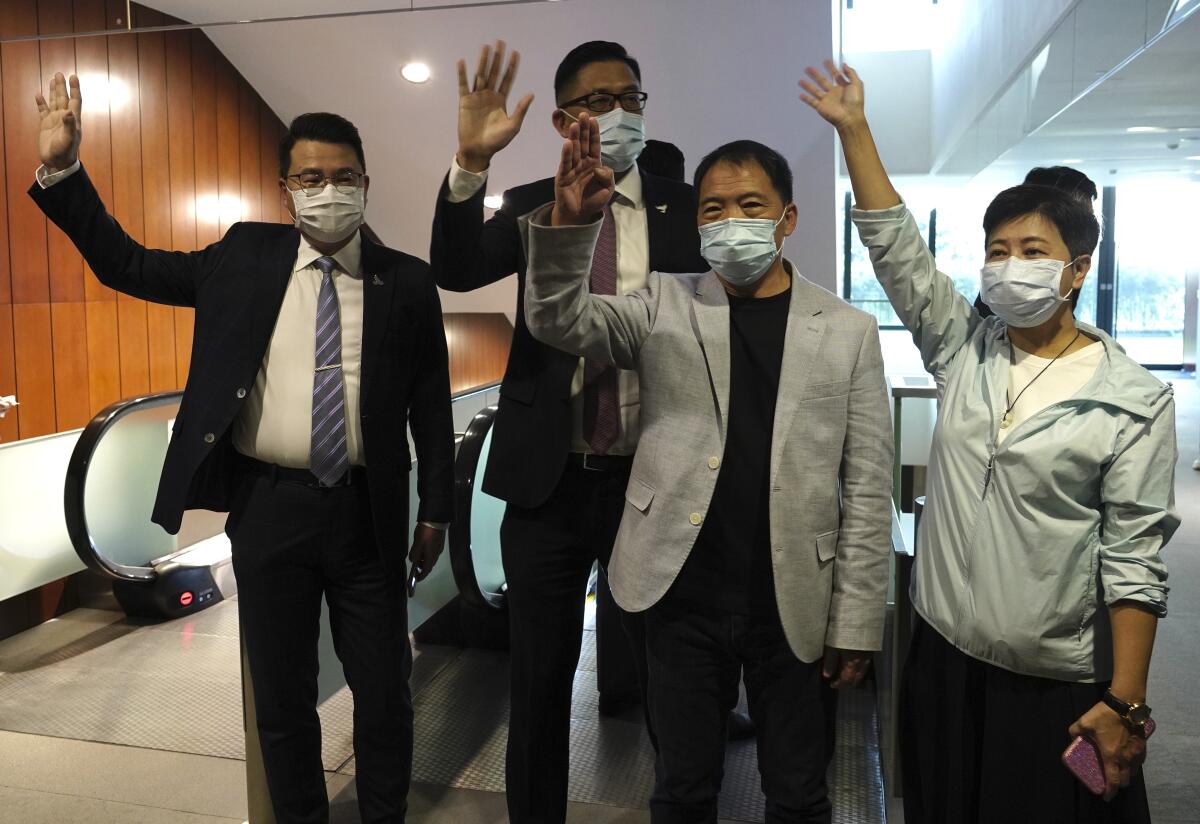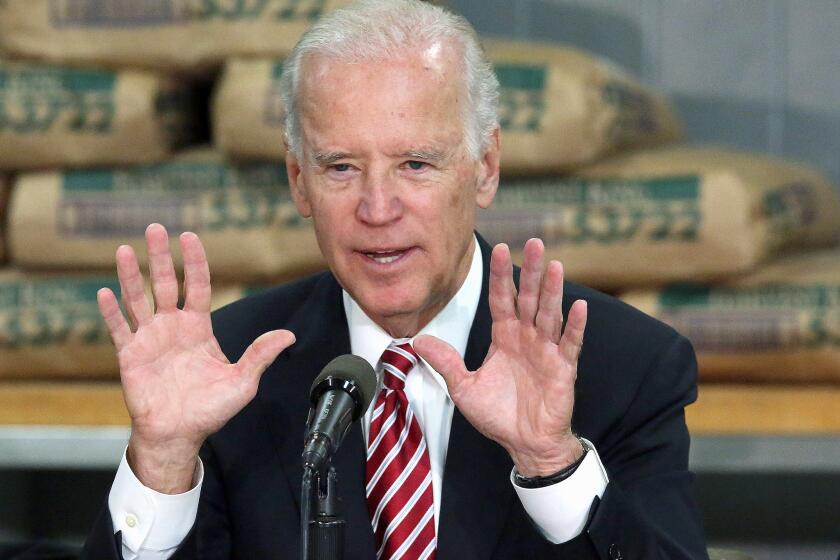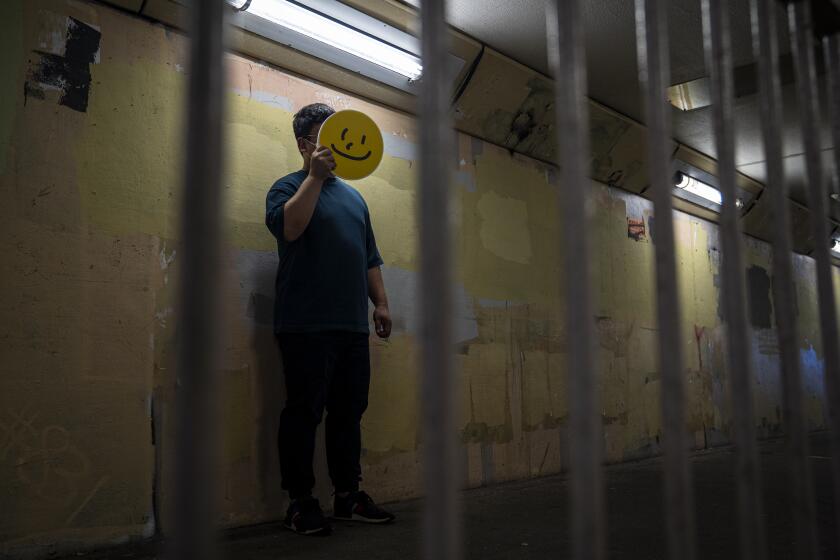Concern in West grows as Hong Kong lawmakers hand in resignations

- Share via
HONG KONG — Hong Kong’s pro-democracy legislators began resigning in protest Thursday as Western countries, including the U.S., denounced China’s growing curtailment of the city’s promised autonomy.
The lawmakers’ resignations came one day after Hong Kong’s pro-Beijing government ousted four fellow pro-democracy members of the Legislative Council. The 15 remaining members of the bloc said they would resign en masse in a show of solidarity after the Chinese government passed a resolution this week that led to the four lawmakers’ disqualification.
Most of the 15 did not attend a regular session of the legislature Thursday, and some later handed in resignation letters at the Legislative Council’s secretariat.
China sharply criticized the move. Its Hong Kong and Macao Affairs Office called the mass resignation “an open challenge” against the authority of the central government and the Basic Law, Hong Kong’s constitution.
“If these lawmakers hope to use their resignation to provoke opposition and beg for foreign interference, they have miscalculated,” the office said in a statement.
But the U.S. and Britain were among the Western countries that condemned Beijing’s escalating crackdown on the political and civil freedoms that Hong Kongers were meant to enjoy for 50 years after the city was handed back to China in 1997.
How will Joe Biden handle the sensitive relationship between superpower rivals China and the U.S.?
Britain summoned China’s ambassador in London to register “deep concern at this latest action by [the Chinese] government,” Foreign Office minister Nigel Adams told British lawmakers Thursday.
Adams declared it the third breach of the Sino-British agreement on Hong Kong since 1997 and the second one in the last six months. He said China’s actions were “designed to harass and stifle all voices critical of China’s policies” and would leave Hong Kong with a “neutered legislature.”
Added British Foreign Secretary Dominic Raab: “China has once again broken its promises and undermined Hong Kong’s high degree of autonomy. The U.K. will stand up for the people of Hong Kong, and call out violations of their rights and freedoms.”
President Trump’s national security advisor, Robert O’Brien, said that the Chinese Communist Party had violated its international commitment to the people of Hong Kong.
“‘One country, two systems’ is now merely a fig leaf covering for the CCP’s expanding one-party dictatorship in Hong Kong,” he said, referring to the Sino-British agreement.
Less than two weeks under a new national security law enacted by Beijing, Hong Kong residents already feel a curtain of control falling over the city’s realms of speech and thought.
Australian Foreign Minister Marise Payne said in a statement that the disqualification of the four lawmakers “seriously undermined” Hong Kong’s democratic processes and institutions.
Wu Chi-wai, the head of the pro-democracy bloc, accused the Chinese and Hong Kong governments of trying to take away the separation of powers in the city, since the ousting of the four lawmakers bypassed the courts.
“We lost our check-and-balance power, and all the constitutional power in Hong Kong rests in the chief executive’s hands,” Wu said.
Claudia Mo, a pro-democracy lawmaker who also handed in her resignation, added: “We are quitting the legislature only at this juncture. We’re not quitting Hong Kong’s democracy fight.”
China’s ‘purification’ of classrooms: A new law erases history, silences teachers and rewrites books
China’s crackdown on Hong Kong is purging teachers, rewriting textbooks and increasing pressure on schools over what to put in the minds of students. A new national security law has endangered freedom of thought and expression.
Earlier in the day, one of the pro-democracy lawmakers, Lam Cheuk-ting, unfurled a banner from a balcony inside the Legislative Council building that said Chief Executive Carrie Lam had brought disaster to Hong Kong and its people.
The mass departure of the pro-democracy bloc will leave Hong Kong’s legislature with just 43 lawmakers, 41 of whom belong to the pro-Beijing camp.
The liberal lawmakers announced their decision to resign Wednesday, hours after the Hong Kong government said it was disqualifying legislators Alvin Yeung, Dennis Kwok, Kwok Ka-ki and Kenneth Leung.
The four had urged foreign governments to sanction China and Hong Kong as China cracked down on dissent in Hong Kong. Beijing accused them of violating their oaths of office.
Get our L.A. Times Politics newsletter
The latest news, analysis and insights from our politics team.
You may occasionally receive promotional content from the Los Angeles Times.
A resolution passed this week by the Standing Committee of China’s National People’s Congress said that any lawmaker who supports Hong Kong’s independence, refuses to acknowledge Chinese sovereignty over the city, threatens national security or asks external forces to interfere in the city’s affairs should be disqualified.
Chinese foreign ministry spokesman Wang Wenbin reiterated Beijing’s support for Hong Kong’s government Thursday, saying that it was “fulfilling its duty according to the NPC Standing Committee’s decision.”
“No country will turn a blind eye to acts of betrayal of the country by public officials, including members of the Legislative Council, who break their oaths of office,” Wang said at a daily news briefing.
But the European Union’s top diplomat, Josep Borrell, said China’s moves “constitute a further severe blow to political pluralism and freedom of opinion in Hong Kong.”
“We call for the immediate reversal of these decisions by the authorities in Beijing and Hong Kong government and for the immediate reinstatement of the Legislative Council members,” he said in a statement.
Sign up for Essential California
The most important California stories and recommendations in your inbox every morning.
You may occasionally receive promotional content from the Los Angeles Times.









